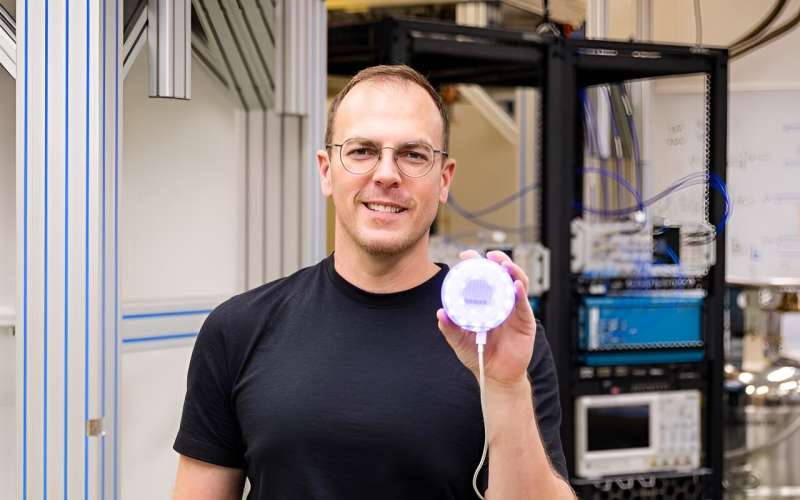This article has been reviewed according to Science X's editorial process and policies. Editors have highlighted the following attributes while ensuring the content's credibility:
fact-checked
trusted source
proofread
Quokka: A tiny, personal quantum computer emulator

Bearing the smiling face of one of Australia's cutest marsupials is a device its creators are claiming as the world's first consumer product in quantum computing technology.
Developed by researchers from the Center for Quantum Software and Information (QSI) at the University of Technology Sydney, the Quokka is an affordable, fit-in-the-hand personal quantum computer emulator that can run programming languages written for quantum computing and return results.
It's a concept that's already off the drawing board and in the hands of pilot customers around the world, with pre-sales now underway and shipment due to start in July, under the auspices of a spinout company Eigensystems.
The company has been cofounded by Associate Professor Simon Devitt, a quantum technology researcher with deep connections to industry, and Associate Professor Chris Ferrie, who aside from his quantum research has a passion for making science and technology, including quantum computing, accessible and understandable to everyone.
The stated mission of Eigensystems is to "democratize access to the exciting and rapidly growing field of quantum computing by empowering the next generation of scientists, engineers, and innovators through education."
"Quantum technology has had limited engagement beyond the rarefied world of research and that means we need to reimagine what quantum education is and who it's for," Ferrie said.
"Traditional STEM education is based on 100 year-old pedagogy in a world driven by information processing. The word quantum does not appear in the national or any state curriculum.
"Quantum literacy will define the cutting edge of 21st century innovation, but until now there hasn't been a guided path into quantum computing for students, educators and hobbyists, to explore the field and discover the possibilities.

"The Quokka allows users to explore the practical applications of quantum computing, providing hands-on and tactile experiences with cutting-edge technology."
The Quokka emulates something that doesn't exist just yet—a 30-qubit fault-tolerant quantum computer.
Ferrie said existing quantum devices are prone to errors and do not execute quantum programs faithfully, so the Quokka is rather an emulation of future quantum computers.
"The Quokka platform, including the device, is a tool for hands-on learning. It acts as a fault-tolerant quantum computer, unlike other quantum simulators," he said.
"It allows you to experiment and learn about quantum algorithms and programs by interfacing with it exactly as you would have to with a future fault-tolerant quantum computer.
"A big part of the objective in creating the Quokka is to generate a dynamic learning ecosystem to reach students, enthusiasts and professionals alike.
"The basic tier of the platform comprises three programming interfaces. At the advanced level is a comprehensive library of content with access to lessons, tutorials, curated community projects, and the ability to share, mix, and co-create projects.
"Then there's Quokka Stories, a collection of narrative-driven lessons targeting the educational curriculum, reimagining science, technology, engineering and mathematics through the lens of information processing.
"We're looking to revolutionize the way people learn about quantum computing and STEM education in general, produced at a cost that makes it accessible to a wide range of users with limited budgets, including schools and educators."



















